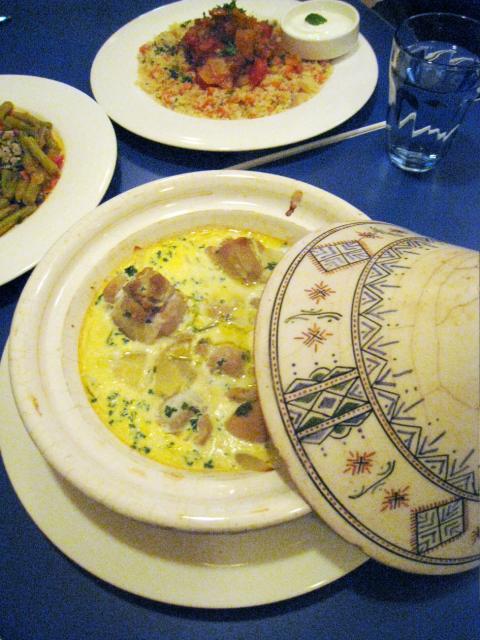With its mix of cereals, legumes, fresh fruit and vegetables, dairy products, fish and olive oil, the Mediterranean diet recently made UNESCO’s Intangible Cultural Heritage list. Some 10,000km from its provenance, Akte Mediterranean Cafe (阿克特地中海小館) carries a smallish but solid selection of dishes from the region.
Opened in July, the restaurant is the latest project by Maggie Liu (廖憶嘉), a celebrity chef who owns Le Bistro de l’Olivier on Anhe Road (安和路) in Taipei and serves as the culinary consultant behind Pot Pie Cafe’s (波特英式小館) menu.
Liu’s cafe emphasizes the culinary traditions of Morocco and Greece, with choices including harira (NT$150), a delightful chickpea, tomato, celery and fresh herb soup from the Muslim kingdom.

Photo: Ho Yi, Taipei Times
For salad, you can hardly go wrong with the Sicilian caponata (NT$160), which is composed of eggplant, celery and pine nuts seasoned with a sweet vinegar dressing. The lightly spiced Turkish-style beef stuffed eggplant with lentil rice and sour cream (NT$320) is a healthy main dish that packs plenty of zing and tang.
Other main dish options include the Greek meatballs with couscous and sour cream (NT$260). Covered with fresh tomato sauce, the meatballs are lean and toothsome, and the couscous, which many chefs overcook, is pleasantly tender and aromatic.
The restaurant’s piece de resistance is undoubtedly the tagine, or tajine, a Moroccan stew named after the clay pot in which it is slowly simmered. Akte’s Essaouira-style chicken tagine with pita bread (NT$320) combines pieces of tender chicken breast, eggs, vegetables, vanilla and other spices and herbs to form an aromatic mix that has a velvety texture similar to that of an expertly made quiche filling or omelet.
Other must-tries at Akte include the traditional Moroccan lamb with pita bread (NT$480) and the m’hanncha (NT$120), a traditional Moroccan pastry filled with almond paste and cinnamon and dipped in honey syrup. The pastry is served warm and pairs well with Moroccan mint tea (NT$180). For pudding enthusiasts, the galaktoboureko (NT$120), a type of custard pie made from milk, semolina and a flaky phyllo pastry shell coated in lemon syrup, may look tempting, but the overall taste sensation pales in comparison with that of the ambrosial m’hanncha. And for diners with big appetites, the almond yogurt shake (NT$150) is so filling that it could count as a dessert on its own.
The restaurant offers a dinner set menu (NT$390 for one and NT$1,080 for two) as well as afternoon tea sets (NT$190 to NT$360, available from 2pm to 5pm).
Located a stone’s throw from Pot Pie Cafe, Akte displays a disregard for slick interior design; its color scheme exudes a vaguely Mediterranean feel. Although the tables are tightly spaced, Akte is comfortable enough to enjoy a relaxed meal with friends or while away a few hours chatting over its light refreshments.

May 18 to May 24 Pastor Yang Hsu’s (楊煦) congregation was shocked upon seeing the land he chose to build his orphanage. It was surrounded by mountains on three sides, and the only way to access it was to cross a river by foot. The soil was poor due to runoff, and large rocks strewn across the plot prevented much from growing. In addition, there was no running water or electricity. But it was all Yang could afford. He and his Indigenous Atayal wife Lin Feng-ying (林鳳英) had already been caring for 24 orphans in their home, and they were in

On May 2, Chinese Nationalist Party (KMT) Chairman Eric Chu (朱立倫), at a meeting in support of Taipei city councilors at party headquarters, compared President William Lai (賴清德) to Hitler. Chu claimed that unlike any other democracy worldwide in history, no other leader was rooting out opposing parties like Lai and the Democratic Progressive Party (DPP). That his statements are wildly inaccurate was not the point. It was a rallying cry, not a history lesson. This was intentional to provoke the international diplomatic community into a response, which was promptly provided. Both the German and Israeli offices issued statements on Facebook

Even by the standards of Ukraine’s International Legion, which comprises volunteers from over 55 countries, Han has an unusual backstory. Born in Taichung, he grew up in Costa Rica — then one of Taiwan’s diplomatic allies — where a relative worked for the embassy. After attending an American international high school in San Jose, Costa Rica’s capital, Han — who prefers to use only his given name for OPSEC (operations security) reasons — moved to the US in his teens. He attended Penn State University before returning to Taiwan to work in the semiconductor industry in Kaohsiung, where he

Australia’s ABC last week published a piece on the recall campaign. The article emphasized the divisions in Taiwanese society and blamed the recall for worsening them. It quotes a supporter of the Taiwan People’s Party (TPP) as saying “I’m 43 years old, born and raised here, and I’ve never seen the country this divided in my entire life.” Apparently, as an adult, she slept through the post-election violence in 2000 and 2004 by the Chinese Nationalist Party (KMT), the veiled coup threats by the military when Chen Shui-bian (陳水扁) became president, the 2006 Red Shirt protests against him ginned up by